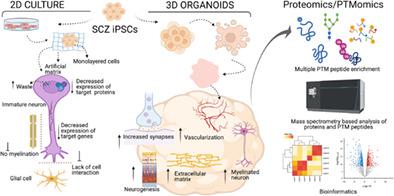当前位置:
X-MOL 学术
›
STEM CELLS
›
论文详情
Our official English website, www.x-mol.net, welcomes your
feedback! (Note: you will need to create a separate account there.)
A protein-centric view of in vitro biological model systems for schizophrenia
STEM CELLS ( IF 4.0 ) Pub Date : 2021-08-25 , DOI: 10.1002/stem.3447 Abinaya Chandrasekaran 1 , Pia Jensen 2 , Fadumo A Mohamed 1 , Madeline Lancaster 3 , Michael E Benros 4, 5 , Martin R Larsen 2 , Kristine K Freude 1
STEM CELLS ( IF 4.0 ) Pub Date : 2021-08-25 , DOI: 10.1002/stem.3447 Abinaya Chandrasekaran 1 , Pia Jensen 2 , Fadumo A Mohamed 1 , Madeline Lancaster 3 , Michael E Benros 4, 5 , Martin R Larsen 2 , Kristine K Freude 1
Affiliation

|
Schizophrenia (SCZ) is a severe brain disorder, characterized by psychotic, negative, and cognitive symptoms, affecting 1% of the population worldwide. The precise etiology of SCZ is still unknown; however, SCZ has a high heritability and is associated with genetic, environmental, and social risk factors. Even though the genetic contribution is indisputable, the discrepancies between transcriptomics and proteomics in brain tissues are consistently challenging the field to decipher the disease pathology. Here we provide an overview of the state of the art of neuronal two-dimensional and three-dimensional model systems that can be combined with proteomics analyses to decipher specific brain pathology and detection of alternative entry points for drug development.
中文翻译:

以蛋白质为中心的精神分裂症体外生物模型系统
精神分裂症 (SCZ) 是一种严重的脑部疾病,以精神病性、阴性和认知症状为特征,影响全球 1% 的人口。 SCZ 的确切病因仍不清楚;然而,SCZ 具有很高的遗传力,并与遗传、环境和社会风险因素相关。尽管遗传的贡献是无可争议的,但脑组织中转录组学和蛋白质组学之间的差异一直在挑战该领域破译疾病病理学。在这里,我们概述了神经元二维和三维模型系统的最新技术,该系统可以与蛋白质组学分析相结合,以破译特定的大脑病理学并检测药物开发的替代切入点。
更新日期:2021-08-25
中文翻译:

以蛋白质为中心的精神分裂症体外生物模型系统
精神分裂症 (SCZ) 是一种严重的脑部疾病,以精神病性、阴性和认知症状为特征,影响全球 1% 的人口。 SCZ 的确切病因仍不清楚;然而,SCZ 具有很高的遗传力,并与遗传、环境和社会风险因素相关。尽管遗传的贡献是无可争议的,但脑组织中转录组学和蛋白质组学之间的差异一直在挑战该领域破译疾病病理学。在这里,我们概述了神经元二维和三维模型系统的最新技术,该系统可以与蛋白质组学分析相结合,以破译特定的大脑病理学并检测药物开发的替代切入点。











































 京公网安备 11010802027423号
京公网安备 11010802027423号